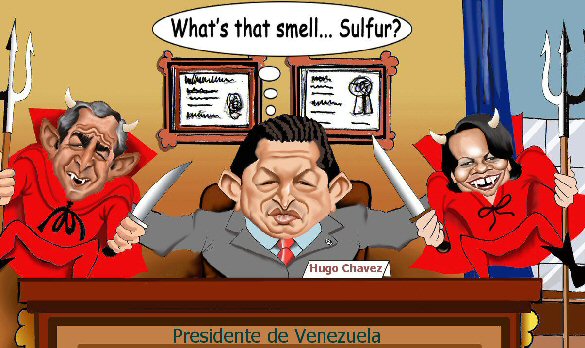
Published on Monday, January 28, 2008 by CommonDreams.orgALBA, an Economic Alternative for Latin America
by Medea BenjaminThe sixth conference of the Latin American alternative trade alliance known as ALBA-which stands for the Bolivarian Alternative for the Americas and means “Dawn†in Spanish-was held in Caracas on January 25-26. The brainchild of Hugo Chavez and Fidel Castro, ALBA was founded by Cuba and Venezuela in 2004 as a fair trade alternative to US-backed free trade policies and is made possible thanks to Venezuela’s oil money.
When Evo Morales was elected in Bolivia and Daniel Ortega in Nicaragua, they too joined ALBA, which Chavez has nicknamed the Club of “Chicos Malosâ€, or bad boys, because of its opposition to U.S. domination. At this weekend’s meeting, the Caribbean island of Dominica also joined, and representatives attended from Ecuador, Honduras, Uruguay, Haiti and several other Caribbean nations.
Chavez opened the session talking about the need for a trade system that addresses people’s needs, not corporate profits. His railed against the “dictatorship of global capitalismâ€, and encouraged Latin American countries to withdraw their international reserves from United States banks, warning of a looming US economic crisis. “Why does that money have to be in the north?â€, he asked. “We should start to bring our reserves back home.â€
His thoughts were echoed by Daniel Ortega, who blamed the capitalist system for the environmental crisis. “The capitalist model of development is simply unsustainable,†Ortega declared. “If your economy is controlled by speculative capital that only cares about profits, you can’t solve the huge problems affecting humanity. Once we renounce the free trade model, we can begin to address the massive problems of unemployment, poverty and global warming.â€
Bolivia’s Evo Morales, who is facing fierce opposition in part because of his efforts to nationalize natural gas and oil, insisted that key public resources such as land, water and energy should not be for private profit but for the common good. He also insisted that Latin America should not look to the United States for solutions, since U.S. aid always comes with strings designed to increase its hegemony.
“In 1990s, the World Bank and the International Monetary Fund imposed their disastrous policies, and then the U.S. tried to impose the Free Trade Agreement of the Americas-which should really be called the Free Profits Agreement of the Americas because it is meant to increase the profits of US corporations,†said Morales. “But people of the hemisphere rejected that agreement, so now the U.S. is trying-country-by-country-to get bilateral trade agreements. They are always trying to divide us, but we salute the great resistance to empire that we see throughout the hemisphere.â€
The leaders noted that it was no coincidence that just at the time of the ALBA summit, Condoleezza Rice was visiting neighboring Colombia to promote a U.S.-Colombia Free Trade pact. Chavez, who recently called Colombia’s President Urribe a “sad peon of the empireâ€, laughed at U.S. accusations that he, Chavez, was facilitating the flow of Colombian cocaine through Venezuela.
The talk of drug-smuggling turned into comic relief, however, when Chavez launched into a discourse on the benefits of the coca leaf, which, he insisted, was very different from cocaine. U.S. officials have long tried to eradicate coca cultivation, which has been grown and chewed by Andean Indians for centuries.
“Speaking of drugs,†Chavez turned to Bolivian President Evo Morales, who is himself a former coca farmer and is a strong defender of the coca leaf, “where are the coca leaves you used to bring me?â€
A Bolivian Indian sitting behind Morales got up and offered up his personal stash of coca leaves. Delighted, Chavez took a leaf and put it in his mouth. “The sacred leaf of the Inca, the Aymara Indians,†he declared. “Thank you, brother.†Emphasizing the great qualities of coca, Chavez said that he had become used to chewing the leaves every morning and invited the other heads of states to try some.
way to push the coca leaf Chavez.